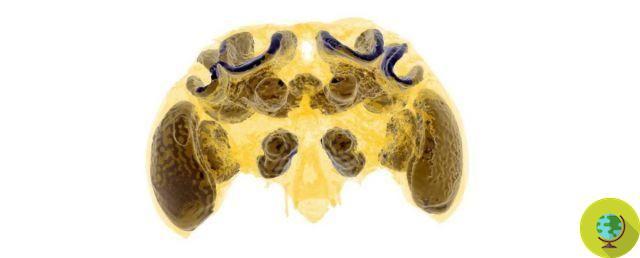He is about to end up run over, his mother saves him
I pesticides they can also compromise the growth and development of brain of the little ones both. It was well known that these substances were harmful to the health of bees and the like, but a new study has found that even the brain of insects is severely tested by poisons used in agriculture.
This was revealed by research conducted by scientists at Imperial College London, who used micro-CT scanning technology to reveal how specific parts of bumblebees' brains grew abnormally when exposed to pesticides during their larval stage.
The conclusion the researchers came to is that children exposed to pesticides, once they become adults, they may not be able to look for food adequately. Once grown, they will struggle to carry out daily tasks such as building a nest, moving around and pollinating flowers.
The team, which published their findings in Proceedings of Royal Society B, used detailed micro-CT scans to gain unprecedented information on insect brain development under the effects of pesticide exposure.
For the research, the little bumblebees were given a nectar substitute enriched with neonicotinoid pesticides, some of which are restricted within the EU but widely used around the world. Once they became adults, their learning ability was tested after three and after 12 days. Their brains were also examined using micro-CT technology at the Natural History Museum. The results were compared with those of other juveniles in the colonies who had not been fed pesticides. Finally, data from adult bumblebees were also examined.
The conclusion of the research
Bees fed pesticide in the larval state had significantly reduced learning ability compared to those fed normally. They were no longer able to perform simple tasks including associating a smell with a food reward.
In addition, they also had a smaller volume of an important part of the brain, responsible for the learning ability of insects. Unfortunately, even more disturbing, the effect of pesticides resulted permanent.

©Imperial College of London
"Bee colonies act like superorganisms, so when any toxins enter the colony, they can potentially cause problems for their development," said lead researcher Dr. Richard Gill of Imperial College's Department of Life Sciences. “Worryingly, in this case, when the young bees ate food contaminated with pesticides, it caused a reduction in parts of the brain, leading the older ones to have smaller brains and functional deficits; an effect that seems permanent and irreversible ".
Another aspect of concern to scientists is that a colony can be hit weeks after the first exposure.
"These results reveal how colonies can be affected by pesticides weeks after exposure, as their young become adults who may not be able to forage adequately."
Future generations may not be able to feed the colony, putting its existence at risk. A prospect that is really scary if you consider that bumblebees are among the most important and useful pollinating insects for humans and the ecosystem.
Sources of reference: Imperial College of London, Proceedings of the Royal Society
READ also:
- The incredible ability of the bumblebees to activate the "energy saving mode"
- Humanity needs bumblebees, but it is causing them to die out faster than expected
- Neonicotinoids: Bees and bumblebees attracted to killer pesticides as if it were drugs
- If you don't reduce the use of pesticides for bees, it will be too late
- Bee killer pesticides are banned but continue to contaminate European fields


























